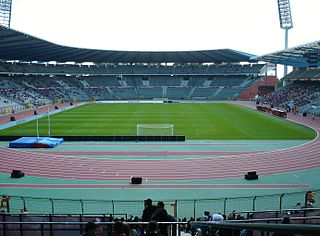
The King Baudouin Stadium is a sports ground in Brussels, Belgium. Located in the north-western district of the City of Brussels, it was built to embellish the Heysel/Heizel Plateau in view of the 1935 Brussels International Exposition. It was inaugurated on 23 August 1930, with Crown Prince Leopold attending the opening ceremony. The stadium hosted 70,000 at the time. Its name honours King Baudouin, Leopold's successor as King of the Belgians from 1951 to his death in 1993.

The Stade de France is the national stadium of France, located just north of Paris in the commune of Saint-Denis. Its seating capacity of 80,698 makes it the largest stadium in France. The stadium is used by the French national football and rugby union teams for international competitions. It is the largest in Europe for track and field events, seating 78,338 in that configuration. During other events, the stadium's running track is mostly hidden under the football pitch.

Parc des Princes is an all-seater football stadium in Paris, France. It is located in the south-west of the French capital, inside the 16th arrondissement, near the Stade Jean-Bouin and Stade Roland Garros.

The Stade Vélodrome, known for sponsorship reasons as the Orange Vélodrome since June 2016, is a multi-purpose stadium in Marseille, France. It is home to the Olympique de Marseille football club of Ligue 1 since it opened in 1937, and has been a venue in the 1938 and 1998 FIFA World Cups; the 1960, 1984 and 2016 editions of the UEFA European Championship; and the 2007 and 2023 Rugby World Cup. It occasionally hosts RC Toulon rugby club of the Top 14. It is the largest club football ground in France, with a capacity of 67,394 spectators. The stadium is also used regularly by the France national rugby union team.
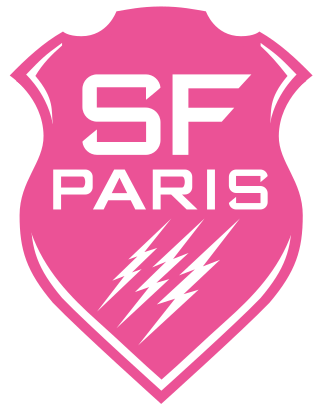
Stade Français Paris is a French professional rugby union club based in the 16th arrondissement of Paris. The club plays in the Top 14 domestic league in France and is one of the most successful French clubs of the modern era. The original Stade Français was founded in 1883. In its current form, the club was founded in 1995 with the merger of the rugby sections of the Stade Français and Club Athlétique des Sports Généraux (CASG).
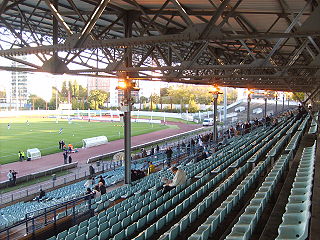
The Stade Yves-du-Manoir is a rugby, track and association football stadium in Colombes, near Paris, France.

The Stade Bollaert-Delelis is the main football stadium in Lens, France, that was built in 1933. It is the home of RC Lens. The stadium's capacity is 38,223 – about 7,000 more than the city's population. The stadium was originally named after Félix Bollaert, a director of Compagnie des Mines de Lens who was anxious to promote the development of sports clubs in the city. Construction began in 1931, but Bollaert had died shortly before the stadium's inauguration. It was renamed Stade Bollaert-Delelis in 2012 after the death of André Delelis, the former mayor of the city who was politician who served as the Minister of Commerce under President François Mitterrand.

Le Havre Athletic Club, commonly known simply as Le Havre, is a French professional association football club based in Le Havre, Normandy. The football club was founded in 1894 as a section of the sports club of the same name, founded in 1884. Le Havre plays in Ligue 1, the first tier of French football, after securing promotion from Ligue 2 as winners of the 2022–23 season, and plays its home matches at the Stade Océane.

The Stade Ernest-Wallon is a multi-purpose stadium located in the Sept Deniers district of Toulouse, in southwestern France. Described as a "temple to the oval ball", it is the home ground for the rugby union club Stade Toulousain and the rugby league club Toulouse Olympique.
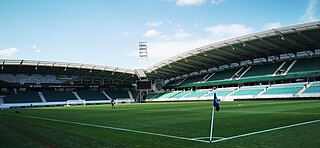
Stade du Hameau is a versatile stadium and sports convention center located in Pau, France. The construction started in 1948 and the stadium has been owned by the city of Pau since 1983, when it was transferred from the French army. The primary use of this stadium is for rugby union matches, serving as the home ground for the French club Section Paloise.

Stade Sébastien-Charléty, also known as Stade Charléty or Charléty, is a multi-purpose stadium located in the 13th arrondissement of Paris, France. Comprising a running track and a football field, the stadium is a 20,000-seat state-owned venue used for numerous sports and events. It is also the current home ground of the rugby union team of Paris Université Club, who operate the venue, and the association football clubs Paris FC and Paris 13 Atletico.
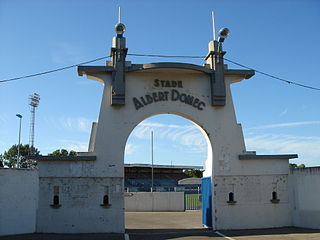
Stade Albert Domec is a multi-use municipal stadium in Carcassonne, France. It has a capacity of 10,000 spectators. It is the home ground of Pro D2 rugby union club Union Sportive Carcassonnaise and Elite One Championship rugby league club Association Sportive de Carcassonne XIII. It is also used by the association football club Football Agglomération Carcassonne for their big matches. Built in 1899, it is one of the oldest stadiums in France, and was renovated in 2002, and again in 2012 when US Carcassonne entered the Pro D2. The stadium is named after the French rugby union player Albert Domec, who died 20 September 1948, and who represented France in 1939. The stadium is also equipped for athletics and has an eight lane 400m track.

The 2007–08 Top 14 Competition was a French domestic rugby union club competition, operated by the Ligue Nationale de Rugby (LNR). Because France hosted the 2007 Rugby World Cup, the competition did not begin at its normal time of August, but instead started on the last weekend in October 2007, one week after the Rugby World Cup final. The league compensated for the late start by playing on several weekends that it normally skips, namely the weekends of the 2008 Six Nations Championship and the semifinals and final of the 2007–08 Heineken Cup. The season ended on June 28, 2008, with Toulouse defeating regular-season league leader Clermont 26–20 in the final and thereby lifting the Bouclier de Brennus.

The Stade des Alpes is a rugby and football stadium in Grenoble, France. The stadium seats 20,068 and hosts the home games of Grenoble Foot 38 and the FC Grenoble rugby club. Situated in Paul Mistral Park, it replaced their stadium Stade Lesdiguières.

The Stade Océane is a football stadium in Le Havre, France. Its capacity is 25,178 all-seated and it is the home ground of Ligue 1 club Le Havre AC. It replaced the Stade Jules Deschaseaux as the club's home stadium. Its inauguration was 12 July 2012, with a friendly fixture between Le Havre and Lille.
The 1902–03 French Rugby Union Championship was won by the Stade Français, winning the final against the Stade Olympiens des étudiants Toulousains (SOET) with a score of 16–8.
The 1913–14 French Rugby Championship was contested by the winners of the regional championship of the USFSA.
The 2015–16 Ligue 2 season was the 77th season since its establishment.
The 2015–16 Top 14 competition was a French domestic rugby union club competition operated by the Ligue Nationale de Rugby (LNR). Two new teams from the 2014–15 Pro D2 season were promoted to Top 14 this year, Agen and Pau in place of the two relegated teams, Bayonne and Lyon. Home-and-away play began on 22 August 2015 and ended on 23 May 2016. This was followed by a playoff stage involving the top six teams, culminating in the final on 24 June 2016 at the Camp Nou in Barcelona, Spain. The final was moved from its traditional site of the Stade de France in Saint-Denis because of a scheduling conflict with UEFA Euro 2016.
The 2016–17 Top 14 competition was the 118th French domestic rugby union club competition operated by the Ligue Nationale de Rugby (LNR). Two new teams from the 2015–16 Pro D2 season were promoted to Top 14 this year, Bayonne and Lyon in place of the two relegated teams, Agen and Oyonnax. It marked the first time that both promoted teams had returned on their first opportunity after relegation.


















